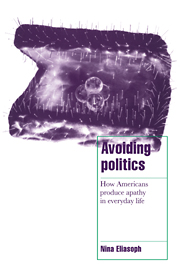Book contents
- Frontmatter
- Contents
- Acknowledgments
- 1 The mysterious shrinking circle of concern
- 2 Volunteers trying to make sense of the world
- 3 “Close to home” and “for the children”: trying really hard not to care
- 4 Humor, nostalgia, and commercial culture in the postmodern public sphere
- 5 Creating ignorance and memorizing facts: how Buffaloes understood politics
- 6 Strenuous disengagement and cynical chic solidarity
- 7 Activists carving out a place in the public sphere for discussion
- 8 Newspapers in the cycle of political evaporation
- 9 The evaporation of politics in the US public sphere
- Appendix 1 Class in the public sphere
- Appendix 2 Method
- Notes
- References
- Index
- Titles in the serious
6 - Strenuous disengagement and cynical chic solidarity
Published online by Cambridge University Press: 17 November 2009
- Frontmatter
- Contents
- Acknowledgments
- 1 The mysterious shrinking circle of concern
- 2 Volunteers trying to make sense of the world
- 3 “Close to home” and “for the children”: trying really hard not to care
- 4 Humor, nostalgia, and commercial culture in the postmodern public sphere
- 5 Creating ignorance and memorizing facts: how Buffaloes understood politics
- 6 Strenuous disengagement and cynical chic solidarity
- 7 Activists carving out a place in the public sphere for discussion
- 8 Newspapers in the cycle of political evaporation
- 9 The evaporation of politics in the US public sphere
- Appendix 1 Class in the public sphere
- Appendix 2 Method
- Notes
- References
- Index
- Titles in the serious
Summary
The private people were not the only group at the country-western clubs. Another group usually sat together, went on outings together, and generally formed a subgroup at the clubs. Considering how continuously this second group of friends made morbid, despairing political jokes, and how much detailed political knowledge they exchanged, and how strong and bitter their opinions were, I was puzzled that they managed not to get involved in doing something about the problems that they so attentively, lovingly catalogued. Clearly, these Buffalo members did engage in political debate, in a potential context of the informal public sphere, but the point of their conversation was always to convince each other that they were smart enough to know that they could not do anything about the problems.
The point of including this comparison case is to show a range of methods for creating politically disengaged public conversation. Making such a strong effort to convince oneself and one's friends of citizens' powerlessness is a way of taking a political position, but it is one that closes off avenues for involvement that go beyond expressions of vehement disengagement. Thus, in the “cycle of political evaporation,” such bitter cynicism enters the potential contexts of the public sphere, but only in order to neuter feelings of political engagement, to keep politics at bay. Ironically, this group, that talked about politics more than any group I encountered, was also the most actively distant from politics.
- Type
- Chapter
- Information
- Avoiding PoliticsHow Americans Produce Apathy in Everyday Life, pp. 154 - 164Publisher: Cambridge University PressPrint publication year: 1998

